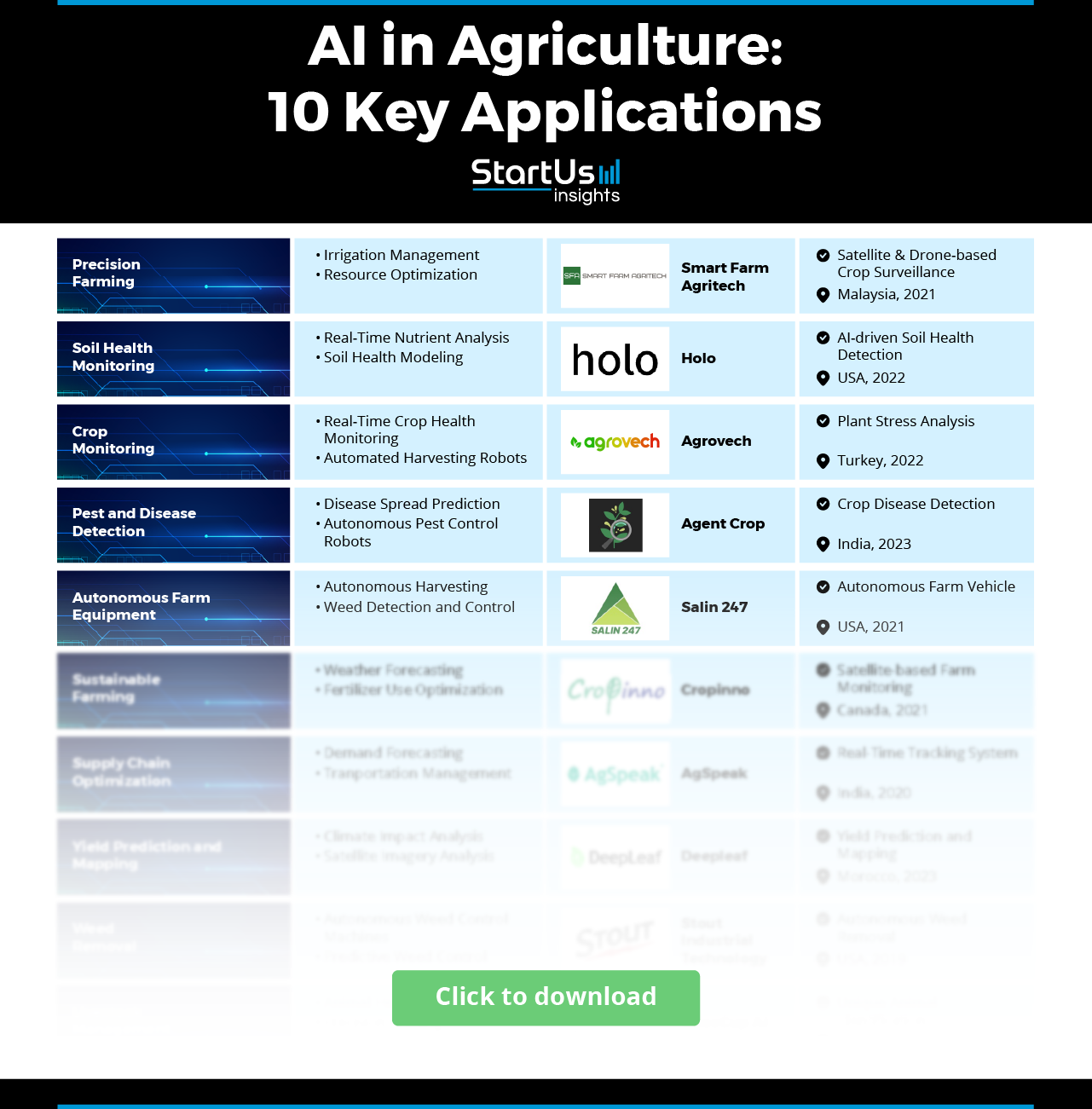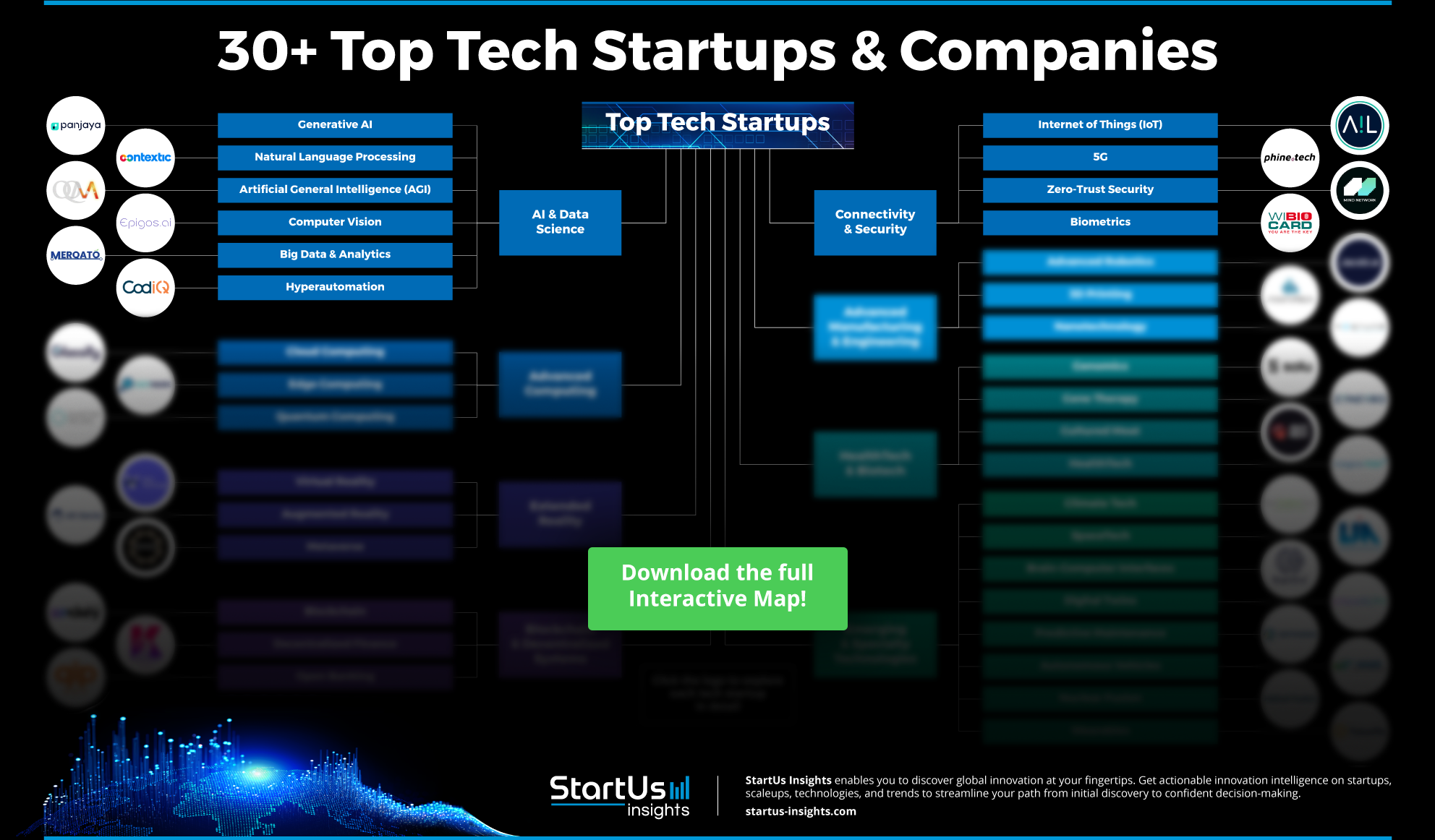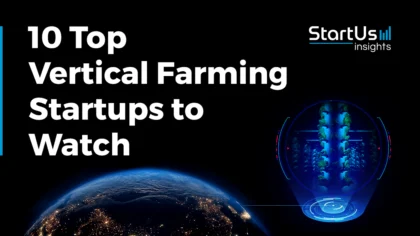The applications of artificial intelligence (AI) in the agriculture industry address important challenges like water scarcity, reduced fertility, and soil erosion. Precision farming leverages historical data to improve decision-making and operational efficiency using AI. These solutions improve soil health, enhance yield prediction, and detect disease by integrating data from soil sensors and weather forecasts. Autonomous farm equipment and supply chain optimization further increase the efficiency of agricultural practices.
As the applications of AI in agriculture continue to evolve, stakeholders need to integrate these emerging innovations into their operations to optimize research capabilities, enhance data-driven decision-making, and address the increasing demand for better farming solutions.
Why should you read this report?
- Gain insights into the top 10 use cases of AI in Agriculture
- Learn about practical use cases for each application
- Meet 10 innovative startups advancing these applications

Key Takeaways
- Precision Farming
- Use Cases:
- Irrigation Management
- Resource Optimization
- Startup to Watch: Smart Farm Agritech
- Use Cases:
- Soil Health Monitoring
- Use Cases:
- Real-Time Nutrient Analysis
- Soil Health Modeling
- Startup to Watch: Holo
- Use Cases:
- Crop Monitoring
- Use Cases:
- Real-Time Crop Health Monitoring
- Automated Harvesting Robots
- Startup to Watch: Agrovech
- Use Cases:
- Pest and Disease Detection
- Use Cases:
- Disease Spread Prediction
- Autonomous Pest Control Robots
- Startup to Watch: Agent Crop
- Use Cases:
- Autonomous Farm Equipment
- Use Cases:
- Autonomous Harvesting
- Weed Detection and Control
- Startup to Watch: Salin 247
- Use Cases:
- Sustainable Farming
- Use Cases:
- Weather Forecasting
- Fertilizer Use Optimization
- Startup to Watch: Cropinno
- Use Cases:
- Supply Chain Optimization
- Use Cases:
- Demand Forecasting
- Transportation Management
- Startup to Watch: AgSpeak
- Use Cases:
- Yield Prediction and Mapping
- Use Cases:
- Climate Impact Analysis
- Satellite Imagery Analysis
- Startup to Watch: Deepleaf
- Use Cases:
- Weed Removal
- Use Cases:
- Autonomous Weed Control Machines
- Predictive Weed Control
- Startup to Watch: Stout Industrial Technology
- Use Cases:
- Livestock Management
- Use Cases:
- Animal Health Analysis
- Precision Feeding
- Startup to Watch: OnceCup AI
- Use Cases:
FAQs: Applications of AI in Agriculture
What is the future scope of AI in agriculture?
AI drives the adoption of precision farming practices which enables farmers to optimize resource usage such as water, fertilizers, and pesticides. It enhances crop monitoring through advanced imaging and sensor technologies to provide real-time insights into plant health and soil conditions.
AI also facilitates automation in farming operations, including planting, irrigation, and harvesting to reduce labor dependency. Additionally, predictive analytics powered by AI forecast weather patterns, crop yields, and market trends, supporting informed decision-making.
What are the challenges of AI in agriculture?
Implementation of AI solutions requires high costs of adoption, which limit accessibility for small-scale farmers. Limited digital literacy in rural areas further restricts its implementation which creates a gap in technological penetration. Data availability and accuracy also pose issues, as diverse agricultural environments require extensive, high-quality datasets for effective AI training.
The integration of AI with existing farming practices often encounters resistance due to traditional farming norms. To ensure farmer’s trust and data protection, it’s essential to have strong frameworks that address privacy and security concerns in agricultural data management.
Where is this Data from?
StartUs Insights provides data through its comprehensive Discovery Platform, which covers 4.7+ million startups, scaleups, and tech companies globally, as well as 20K+ emerging technologies & trends. The platform excels in startup and technology scouting, trend intelligence, and patent searches, offering a detailed view of the innovation landscape.
For this report, we analyzed technologies within specific industries using the trend intelligence feature. During this research, we identified patterns and trends, pinpointing relevant use cases and the startups developing solutions for each. More capabilities and details are available at StartUs Insights Discovery Platform.
Top 10 Applications of AI in Agriculture [2025 & Beyond]
1. Precision Farming
Machine learning, computer vision, and predictive analytics address challenges like soil degradation, pest control, crop disease detection, and water scarcity. Precision farming enables farmers to make decisions based on real-time data collected from various sources like drones and cameras. AI algorithms analyze the data from these sources and facilitate farmers to apply fertilizers, pesticides, and other nutrients with accuracy. It reduces waste and minimizes environmental impact and operational costs. Smart irrigation systems optimize water usage based on real-time conditions and ensure crops receive the right amount of water at the right time.
Diver Deeper:
- Noteworthy Example: John Deere enhances precision farming through the implementation of AI, computer vision, and machine learning. It optimizes herbicide use and applies only when necessary to promote sustainable farming.
- Financial Landscape: AI startups working on precision farming solutions receive a median funding of USD 1.32 million.
Startup to Watch: Smart Farm Agritech
Malaysian startup Smart Farm Agritech combines AI and precision farming for rice and palm oil products. The startup solution enhances crop disease management by using satellite and drone surveillance for detecting pests. Its proprietary technologies include Watchman Satellite System for large-scale crop health surveillance and Crop Doctor for AI-powered disease recognition. By utilizing AI-driven software applications, the startup assists farmers in lowering yield loss and improving soil fertility. It follows an organic-led approach to soil conditioning and pest control by developing biopesticides for paddy fields and oil palm plantations.
2. Soil Health Monitoring
IoT sensors coupled with AI systems enable real-time soil health monitoring through the analysis of parameters like moisture levels, pH, nutrient content, and organic matter composition. AI algorithms analyze data from soil sensors, satellite imagery, and drones to create soil maps which aid farmers in making decisions about crop rotation, irrigation, and fertilizer application.
Real-time nutrient analysis prevents excessive use of fertilizers and optimizes crop growth. AI-powered soil health modeling integrates various data sources like microbial activity, soil structure, and chemical composition that predict soil health trends, and recommends sustainable management practices.
Diver Deeper:
- Noteworthy Example: Teralytic monitors soil health using a per-crop probe placement technique which quantifies the exact needs of soil in terms of fertilizer, water, and other resources.
- Financial Landscape: AI startups working on soil health monitoring solutions receive a median funding of USD 1.02 million.
Startup to Watch: holo
US-based startup Holo develops a farm operating system that utilizes AI to automate farm management tasks. The solution digitizes the workflows and integrates activities like crop planning, field operations, harvesting, inventory, packing, and sales. The platform combines data from soil sensors, weather forecasts, and historical records to optimize crop planning and enhance soil carbon sequestration. The startup’s AI-powered crop planner generates crop plans based on sales forecasts and soil health. It monitors soil health by utilizing soil test data and parameters like water capacity, surface hardness, and organic matter overlaid on the top of the fields.
3. Crop Monitoring
Artificial Intelligence algorithms provide farmers with real-time insights about crop health and field conditions. It enables the detection of early signs of disease, pest infestations, and nutrient deficiencies that improve crop yields and reduce maintenance costs. Real-time crop health monitoring systems analyze data from sources like multispectral imagery and sensors which identify issues before they occur.
Further, automated harvesting robots identify ripe crops through computer vision and machine learning algorithms to navigate fields autonomously, and perform harvesting tasks with precision. This technology addresses labor shortages and increases overall farm productivity. Also, the integration of AI in crop monitoring facilitates predictive analytics for yield forecasting by analyzing historical data, weather patterns, and current crop conditions.
Diver Deeper:
- Noteworthy Example: Syngenta Group offers Cropwise AI solution which leverages machine learning algorithms for crop monitoring. It assists farmers with insights and improves decision-making for optimizing crop yields.
- Financial Landscape: AI startups working on crop monitoring solutions receive a median funding of USD 1.15 million.
Startup to Watch: Agrovech
Turkish startup Agrovech leverages artificial intelligence (AI) for image-based crop monitoring. It receives images from drones and satellites to analyze crop data, improves spraying methods, and enhances irrigation in the fields. The startup offers crop monitoring solutions such as terrain tracking, sprouting detection, plant growth, and chemical drug optimization. AI algorithms process the multispectral data input, and provide insights into crop health, growth stages, and yield estimates. The analysis considers environmental factors such as soil moisture and temperature.
4. Pest and Disease Detection
Advanced imaging technologies in combination with machine learning algorithms detect plant disease early which minimizes crop losses. Drones and robots leverage AI to autonomously monitor crop conditions and provide real-time data. It minimizes crop losses and enables predictive modeling of disease spread by utilizing historical data and weather patterns. Autonomous pest control robots navigate crop areas and identifies pest infection with accuracy. The system sprays pesticides during optimal times at the correct location, reducing chemical usage and improving pest management.
Diver Deeper:
- Noteworthy Example: BASF has developed xarvio, a digital farming solution to monitor the weather and identify problems like crop disease and pest presence in fields.
- Financial Landscape: AI startups working on the solutions of pest and disease detection receive a median funding of USD 1.63 million.
Startup to Watch: Agent Crop
Indian startup Agent Crop detects plant diseases utilizing AI-powered computer vision models and supports plant health monitoring. It provides treatment for pest disease and increases the production and profit for farmers. The solution integrates into the client’s technical requirements with customizable request, response, and authentication formats. The startup offers a unique API key to approve requests and operates on a usage-based pricing model. The startup’s platform offers multi-language support and unlimited free use of disease detection for a wide variety of plants.
5. Autonomous Farm Equipment
By utilizing robotics and machine learning algorithms, autonomous farm equipment navigates fields using GPS and sensor data. It performs tasks like plowing, seeding, and harvesting without human intervention. This solution reduces labor costs, adheres to weather conditions, and minimizes the damage to the crops. Weed detection and control tools utilize AI to identify weed species and allow targeted weed management which minimizes herbicide use and environmental impact. Further, autonomous robotic systems optimize resource use by precisely spraying weed and contributing to enhanced sustainability.
Diver Deeper:
- Noteworthy Example: Monarch Tractor launches a smart tractor that combines edge AI, automation, and data analysis to enable farmers to improve field safety.
- Financial Landscape: AI startups working on the solutions of pest and disease detection receive a median funding of USD 5.08 million.
Startup to Watch: Salin 247
US-based startup Salin 247 develops a platform for lightweight autonomous crop production machines that operate using AI algorithms. The machine performs multiple field operations by utilizing an electrically powered engine and is energy-efficient. It comprises several modes, of which the drive unit features easy attachment to customizable implements.
The planter mode and cultivator mode attach respective equipment pre-defined number of rows and row width. Post-emerge liquid sprayer mode consists of a modifiable tank size for herbicide and fungicide applications. Other modes include a dry applicator and a side dress nitrogen applicator. The startup offers labor cost reduction for farmers and uses real-time kinematic positioning (RTK-GPS) for navigating the fields.

6. Sustainable Farming
Sustainable farming practices address environmental challenges and enhance productivity by optimizing resource allocation and adapting to climate change. AI algorithms analyze data from sensors, satellite images, and drones. Machine learning and data analytics provide insights into soil conditions, crop health, and environmental factors.
It aids in minimizing waste and enables precise usage of water, fertilizers, and pesticides. AI models process meteorological data and generate localized weather predictions. This solution allows farmers to follow harvesting patterns and adapt to weather-related risks. Similarly, AI optimizes fertilizer use by analyzing soil composition, crop requirements, and environmental factors to determine the optimal amount and timing of fertilizer needed.
Diver Deeper:
- Noteworthy Example: AppHarvest focuses on sustainable farming by using less water than open-field agriculture and supports the usage of recycled water
- Financial Landscape: AI startups working on the solutions of sustainable farming in the agriculture industry receive a median funding of USD 1.5 million.
Startup to Watch: Cropinno
Canadian startup Cropinno enables sustainable farming by leveraging satellite intelligence and AI-powered decision support tools. It provides infra-red images of farmland to deliver insights about managing the fields with precision. Further, it creates a productivity map that examines historical data of the fields to assess soil fertility.
It leverages machine learning algorithms for identifying crops grown in different geographies. It enhances farm management by utilizing satellite farm monitoring and detecting the issues early. The startup features a stress detection algorithm that identifies impact areas that lead to crop loss. Also, it ensures AI-powered risk assessment which understands the farm’s characteristics and guides in the validation process for insurance claims.
7. Supply Chain Optimization
The integration of AI solutions in the agriculture supply chain enhances goods management from the farm to the consumer. AI-powered analytics aid in precise predictions and decision-making at every stage of the supply chain. It analyzes data that includes weather forecasts, rainfall metrics, and real-time sensor data. By processing past data and real-time market trends, AI models predict consumer demand and forecast yield volumes to maintain precise raw material storage. In transportation management, AI solutions offer real-time conditions like the temperature and humidity of goods during transit.
Diver Deeper:
- Noteworthy Example: Nutrien enhances the resilience and visibility of its supply chain operations by leveraging artificial intelligence and machine learning. It tracks assets, monitors product movements, and determines inventory requirements which enables response to the customer needs.
- Financial Landscape: AI startups working on the solutions of supply chain optimization in the agriculture industry receive a median funding of USD 2.1 million.
Startup to Watch: AgSpeak
Indian startup AgSpeak offers AI-driven supply chain solutions for agricultural businesses. It integrates blockchain to streamline activities across the supply chain from the source to the consumer. The solution ensures traceability, optimizes resources and downtime, and promotes sustainable food production practices. The company’s platform enhances regulatory compliance and builds consumer trust in the products. Using AI-powered analytics, AgSpeak’s platform reduces operational losses and improves team productivity by addressing supply chain bottlenecks.
8. Yield Prediction and Mapping
By leveraging machine learning and deep learning, AI models analyze remote sensing data to monitor crop growth patterns. This solution predicts crop yields to optimize harvesting schedules for farmers. Satellite imagery and predictive analytics facilitate crop yield forecasting and improve resource allocation.
It allows farmers to precisely allocate resources like water, fertilizers, and pesticides to reduce waste and minimize environmental impact. By combining geospatial data from drones, sensors, and satellites, AI creates yield maps of the field. It highlights areas requiring attention such as irrigation or nutrient application to enhance productivity.
Diver Deeper:
- Noteworthy Example: Trimble facilitates yield monitoring of different seed varieties, and moisture data in real-time and improves the selection of crop data.
- Financial Landscape: AI startups working on the solutions of yield prediction and mapping in the agriculture industry receive a median funding of USD 1.58 million.
Startup to Watch: Deepleaf
Moroccan startup Deepleaf delivers AI-led solutions for yield prediction and mapping. The startup utilizes portable NIR cameras and smartphone applications to provide real-time insights into crop health and management. The solution results in a reduction of pesticide usage and fewer residues at harvest. The startup enhances pest monitoring using DeepFly mini drone which provides eco-friendly pest management solutions. AI algorithms facilitate yield prediction and provide real-time insights for crop mapping. By integrating field monitoring with predictive analytics, Deepleaf reduces chemical pesticide use and improves crop yields.
9. Weed Removal
Traditional weed control methods rely on manual labor and are being replaced by AI-driven weed management technologies. The solution leverages machine learning, computer vision, and robotics to identify and remove weeds. Autonomous weed control machines utilize sensors, high-resolution cameras, and AI algorithms for differentiating crops and weeds. Predictive weed control integrates data from weather patterns, soil condition, and weed distribution maps to forecast weed growth. It allows farmers to optimize herbicide usage and improve crop yields. It reduces environmental impact, labor costs and improves resource efficiency.
Diver Deeper:
- Noteworthy Example: XAG launches agricultural drone that serves large field area monitoring and variable-rate spraying that protects crops from harmful weeds, pests, and diseases
- Financial Landscape: AI startups working on the solutions of Weed Removal in the agriculture industry receive a median funding of USD 2.26 million.
Startup to Watch: Stout Industrial Technology
US-based startup Stout Industrial Technology eliminates weeds by using an AI-driven autonomous weeder system. It reduces manual labor and is equipped with the proprietary Stout True Vision software which captures high-resolution color images. It passes them through a convolutional neural network for analysis and differentiates crops and weeds. Another product Smart Cultivator is a software-defined tractor that uses machine vision and artificial intelligence to cultivate and weed fields using mechanical blades. It addresses labor shortages and reduces chemical usage for the weed removal process.
10. Livestock Management
AI enhances healthcare monitoring, feeding optimization, and disease prevention of the livestock It facilitates animal health analysis by monitoring vital signs, behavior, and movement patterns. Wearable devices equipped with sensors track metrics like heart rate, and temperature and detect early signs of illness or stress. In precision feeding, AI optimizes nutrition by feeding individual animals based on factors like age, weight, and health status. Moreover, automated feeding systems dispense precise quantities of feed at optimal times which minimizes waste and ensures balanced diets.
Diver Deeper:
- Noteworthy Example: Cainthus employs computer vision and AI to improve livestock management. It acquires visual inputs from advanced cameras and turns those into real-time insights for farmers.
- Financial Landscape: AI startups working on the solutions of livestock management in the agriculture industry receive a median funding of USD 0.96 million.
Startup to Watch: OnceCup AI
Canadian startup OnceCup AI develops BETSY, an AI-driven livestock management system that improves the health, welfare, and feeding of cattle herds. It utilizes computer vision and sensors to identify disease, feed intake, and growth metrics of livestock. The product aids in tracking the food input and output which is essential for maintaining feed rations and tracks several disease indicators.
It also tracks disease indicators and time spent on physical activities. The company’s product 360 Live ID employs face recognition capabilities to identify each animal’s distinctive features. This solution enhances cattle identification and generates permanent visual IDs. The system alerts ranchers in case of emergency and delivers pharma behavior insights for livestock.
Leverage Emerging AI-driven Agriculture Technologies
Top investors like SVG Ventures, MassChallenge, Techstars, EIT Food Accelerator Network, and Agfunder support startups focusing on AI applications in the Agriculture industry. They provide crucial funding that drives innovation. This funding majorly spans seed, early-stage VC/series A, accelerator/incubator, pre-seed, and angel rounds. Whereas, the average funding per round stands at USD 8.4 million, supporting early-stage startups developing AI-powered solutions advancing the agriculture industry.
Act now on the emerging technologies transforming the agriculture industry. With StartUs Insights, you swiftly discover hidden gems among over 4.7 million startups, scaleups, and tech companies, supported by 20K+ trends and technologies. Our AI-powered search and real-time database ensure exclusive access to innovative solutions, making the global innovation landscape easy to navigate.
Trusted by industry leaders like Samsung, Nestlé, and Magna, we provide unmatched data, a 360-degree industry view, and data-driven intelligence for confident strategic decisions. Leverage our innovation services to optimize costs, streamline operations, and stay ahead of the curve. Get in touch today to explore how our comprehensive innovation intelligence can drive your success.
Discover All AI-led Agriculture Technologies & Startups!



![AI in Agriculture: A Strategic Guide for Industry Leaders [2025-2030]](https://www.startus-insights.com/wp-content/uploads/2025/03/AI-in-Agriculture-SharedImg-StartUs-Insights-noresize-420x236.webp)




